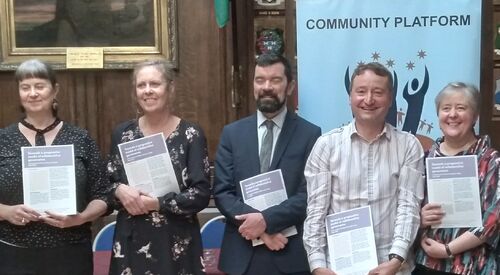The Community Platform is an alliance of 32 national networks and organisations in the community sector, of which the INOU is a member, working to address poverty, social exclusion and inequality. On the 4th of October the Community Platform launched a discussion paper titled Towards a Progressive Model of Collaborative Governance which proposes a more effective model for how the Government works with civil society and those most impacted by inequality and poverty to address the major challenges facing our society such as housing, health, care, poverty and the climate transition.
Previous collaboration in Ireland and abroad suggest the need of a set of core principles based on “recognition of mutual interdependence between state and civil society to tackle and resolve deep rooted and persistent problems.” These core principles are:
- Leadership, with a real willingness to engage and a belief that the process will lead to better outcomes.
- Early trust building and processes to support dialogue and deliberation.
- Identifying power differential and transparent motivation for engagement from all participants.
- Collaboration with relevant stakeholders, and innovation in supporting different forms of participation.
- Co-design and shared decision-making.
- Informed and deliberative approaches and processes valuing relevant expertise and lived experience.
- Flexibility and innovation and linking mechanisms to the issue specific purpose they are required to serve.
- Willingness to adequately resource collaborative processes.
- Commitment to early planning, creating transparent and accountable implementation and monitoring mechanisms.
A number of key structures and monitoring arrangements were recommended to maintain effective collaboration, including: a Collaborative Governance Advisory Body; Issue Specific Work Groups; and the development of “…direct links between the collaborative governance process and relevant Oireachtas committees...”
Under the title of “Processes” the paper puts forth six processes necessary to ensure the collaborative process functions effectively:
Skilled engaged, facilitative and collaborative oriented leadership – “…there is a need to provide specific collaborative leadership training for senior officials across all government departments to embed and enable the necessary [collaborative] mindset and skills.”
Selecting structure and participants – “Establishing the appropriate structure and getting the most appropriate, diverse and directly knowledgeable people around the table on specific issues has the potential to greatly benefit policy.”
Early trust building – “This includes investment of time in building confidence and sharing expectations, and in exploring the historical context and obstacles that might stop collaboration and deliberation. “
Statement of commitment to collaborative governance – “Participants develop an agreement and establish a clear statement of commitment to collaborative governance including shared decision-making and deliberative approaches.”
Resourcing – “The community platform proposes to create four resource streams to enable effective collaborative governance. These include: …Supporting participation…, …Supporting facilitation…, …Deepening accountability…, …Independent research…”
Implementation and monitoring – “The collaborative governance process requires monitoring structures that have a strong focus on implementation and review, so that the outcomes of the deliberative process are delivered as was intended.”
The paper concludes by reiterating the necessity of collaborative government in “widening participation will increase accountability and democratic legitimacy”, and the need for political commitment to engage with this process. To this ends 4 proposals are recommended:
- The Social Dialogue unit in the department of An Taoiseach establish a working group on collaborative governance.
- A Rapid Evidence Assessment is carried out of existing national and international promising practices, including the involvement of elected representatives.
- A Collaborative Governance Advisory Body is set up and resourced to set in motion the building blocks necessary to deliver this new approach.
- Two complex social problems are identified to collaboratively test , design and evaluate governance mechanisms.
The full discussion paper can be found (linked here)
